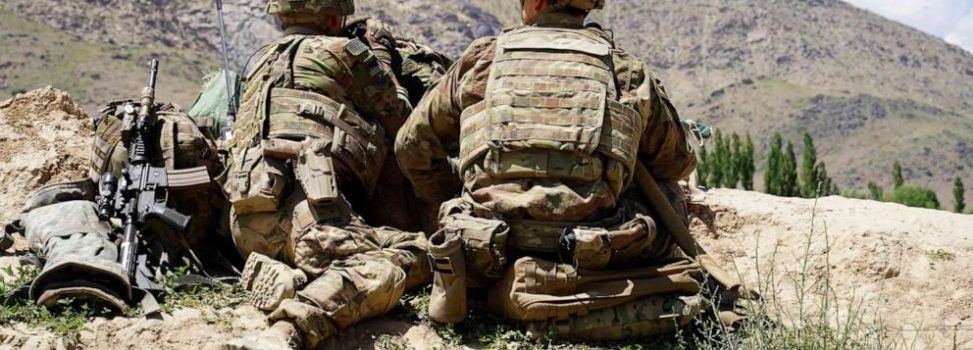Afghanistan: The Next Chapter?
Dr. Andrew Wilder
Vice President, Asia Programs, U.S. Institute of Peace
Thursday, Dec. 3, 2020 at 09:00 am Pacific Time (US and Canada) via Zoom
If you are an NSF member, you will receive an invitation by email to this online event. Please check your email and RSVP your attendance. If you would like to attend this meeting, become a member today!
To all our NSF friends and family, please be safe. As COVID cases rise in our area and around the country and world we hope that everyone stays healthy. Please continue to join our national security discussions on Zoom.
If you missed any of our recent Zoom programs, please check out the recordings posted on our website. Please also stay tuned for upcoming invited commentaries on timely topics. To watch videos of our past programs, read commentaries, and learn about our upcoming programs, and stay connected to NSF news and events visit our website regularly. Scroll down on the landing page to get to our video links): NSF Website
Program details for our upcoming program:
After an intriguing and thought-provoking NSF event on 19 November with Dr. Andrew Bacevich, we will be diving into more details on the path forward and next chapter for the US in Afghanistan. Recent headlines and news stories have not made it easy to figure out what happens next for our troops, our allies, and our security.
“Trump has ‘no plan’ to exit Afghanistan by Christmas, key lawmaker says.” (DefenseNews 29 Oct 2020)
“Even if the warring parties in Afghanistan manage to secure a still-elusive agreement on resolving the current conflict, significant economic challenges remain for the country, which will require continued assistance and support for core government functions.” (Pathways to Post-Peace Development in Afghanistan, USIP 03Nov 2020)
“NATO could pay a heavy price for leaving Afghanistan too early, its chief warned Tuesday after a U.S. official said President Donald Trump is expected to withdraw a significant number of American troops from the conflict-ravaged country in the coming weeks.” (In Homeland Security, 17 Nov 2020)
“President Trump is expected to order the U.S. military to withdraw thousands of troops from Afghanistan, Iraq and Somalia by the time he leaves office in January, using the end of his time in power to significantly pull back American forces from far-flung conflicts around the world.” (New York Times, 18 Nov 2020)
“The Taliban’s tactic of running out the clock on the U.S. troop presence may bear fruit after the announcement on Tuesday that U.S. forces will reduce to 2,500 by January 15.” (Afghanistan withdrawal should be based on conditions, not timelines, USIP 19Nov2020)
After 19 years of American’s longest war, the US is war-weary and all to ready to reassess our national security imperative for remaining in Afghanistan. NSF is honored to have Dr. Andrew Wilder from the U.S. Institute of Peace (USIP) join us to guide us through this complex and evolving national security issue. He will shed light on the peace negotiations with the Taliban, US troop withdrawal, NATO backlash, and the future security of the US and Afghan peoples.
In April 2020, the USIP convened the Afghanistan Peace Process Study Group (ASG), which was charged with identifying policy recommendations about the peace process for Congress, the administration, and the public. Their report is scheduled to be released in early 2021. Dr. Wilder also led a discussion with U.S. Special Representative for Afghanistan Reconciliation Zalmay Khalilzad on 18 September 2020 to discuss the peace process and U.S. goals for negotiations. As the bipartisan ASG continues its work President Trump has directed the imminent withdrawal of US troops from the country, triggering confusion among our allies, the Afghan government, and the region.
Dr. Wilder will help navigate NSF through this morass and address the burning question; “What happens next in Afghanistan?” Rejoinder comments and framing questions will be provided by our NSF discussants, Ted Morse and Rae Huffstutler.
You can learn more about the USIP-ASG at: https://www.usip.org/programs/afghanistan-study-group
You may also want to read USIP recent articles on Afghanistan: https://www.usip.org/regions/asia/afghanistan
Remember that our Zoom webinars are open to the first 100 registrants, so please register early. If you decide that you can’t make it later please delete your registration to allow others to join.
Dr. Andrew Wilder is the vice president of Asia programs. He joined USIP in August 2010 as the director of Afghanistan and Pakistan Programs. Prior to joining the Institute, he served as research director for politics and policy at the Feinstein International Center at Tufts University. Previously, Wilder served as founder and director of Afghanistan’s first independent policy research institution, the Kabul-based Afghanistan Research and Evaluation Unit (AREU). This was preceded by more than 10 years managing humanitarian and development programs in Pakistan and Afghanistan, including with Save the Children, International Rescue Committee, and Mercy Corps International. Wilder is the author of The Pakistani Voter: Electoral Politics and Voting Behaviour in the Punjab (Oxford University Press, 1999), and has written numerous other publications. He has conducted extensive research exploring issues relating to state-building, development and stabilization efforts in Afghanistan and Pakistan. Recent research has focused on electoral politics in Afghanistan, and the effectiveness of aid in promoting stabilization objectives in Afghanistan and Pakistan. Wilder holds a bachelor’s degree in foreign service from Georgetown University. He also holds a master’s degree in law and diplomacy and a doctorate from the Fletcher School of Law and Diplomacy at Tufts University.


